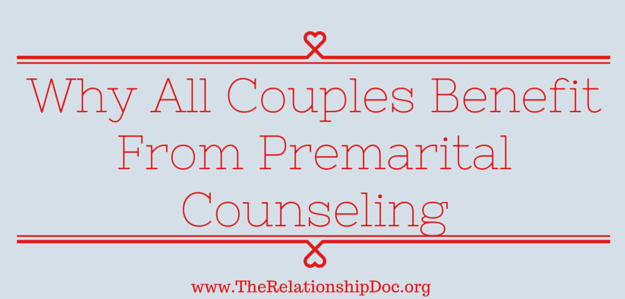 Earlier this year, a group in Colorado proposed a ballot measure that would require pre-marital education classes. It even stipulated “course requirements,” calling for 10 hours of pre-wedding education for those marrying for the first time, 20 hours for people contemplating marriage #2, and third timers needing a minimum of 30 hours of premarital instruction/counseling before proceeding down the aisle.
Earlier this year, a group in Colorado proposed a ballot measure that would require pre-marital education classes. It even stipulated “course requirements,” calling for 10 hours of pre-wedding education for those marrying for the first time, 20 hours for people contemplating marriage #2, and third timers needing a minimum of 30 hours of premarital instruction/counseling before proceeding down the aisle.
Although this proposal didn’t have enough support to make the ballot in the November election, it was far from a horrible idea. The irony is that while couples balk at investing the time and money to better know their chosen life partner (either through educational classes or pre-marital counseling), they will often freely spend countless more hours and dollars agonizing over wedding day details.
There are, of course, those exceptions when couples do attend pre-marital counseling. Sometimes for religious or faith-based reasons, premarital counseling is required. Otherwise, most couples don’t typically even consider it, and that’s unfortunate. Even when partners think they know each other well, the truth is that all too often, they really aren’t clear on what their significant other expects from a marriage.
I recommend couples counseling prior to marriage for the following reasons:
1. To face your issues; address and not overlook areas of incompatibility with your partner. During the early period of your relationship (known as the Romantic Stage), it’s easy to see each other through “rose-colored glasses,” and ignore or not recognize problems that may severely undermine the relationship in the future (if no discussion or understanding exists in advance).
2. Working with an experienced counselor can help expose potential vulnerabilities or weaknesses in the relationship, and force you to deal with the reality of your particular situation.
3. Premarital counseling can clarify your compatibility regarding important topics such as religious preference, having kids, career and life goals.
4. Discussing and disclosing individual attitudes/spending habits regarding money is such an important and often avoided issue, it deserves its own category. Financial disagreements are overall the biggest issue couples struggle with.
5. Sexual preferences/beliefs/attitudes also stand alone, and definitely merit attention. New (usually young) couples tend to believe that sexual issues will magically go away, when, in reality, they actually tend to get worse.
6. The therapist’s office is a safe place to address concerns that either partner has, that need to be hashed out (such as how much time together/apart is acceptable, or is having opposite sex friends okay).
7. Couples counseling can help you learn together how to successfully resolve conflict and communicate. If you can accomplish this before marriage, you’ll be way ahead of the game! Acquiring these two skills is vital to maintaining a healthy relationship.
8. And last, but definitely not least on the reason list, is divorce prevention. Counseling prior to marriage can help maximize your chances of a successful future together.
What to Expect in Premarital Counseling?
Once couples decide to seek premarital counseling, there are often many questions regarding the actual process. In addition to covering the issues discussed above (finances, career, kids, sex-life, extended family dynamics, communication & conflict-resolution skills), you can expect premarital counseling to address the specific concerns you and your partner have about your relationship.
I would recommend committing to four or five premarital counseling sessions, if there are no obvious problems. If specific issues need to be addressed, then more time might be required.
Remember that the goal of premarital counseling is not just to avoid the mistake of marrying the wrong person, it’s also about highlighting areas in your relationship that need attention. More times than not, shining a spotlight on your relationship and investigating any differences will maximize your satisfaction and happiness together. In many ways, premarital counseling might end up being one of the best investments in your lifetime.